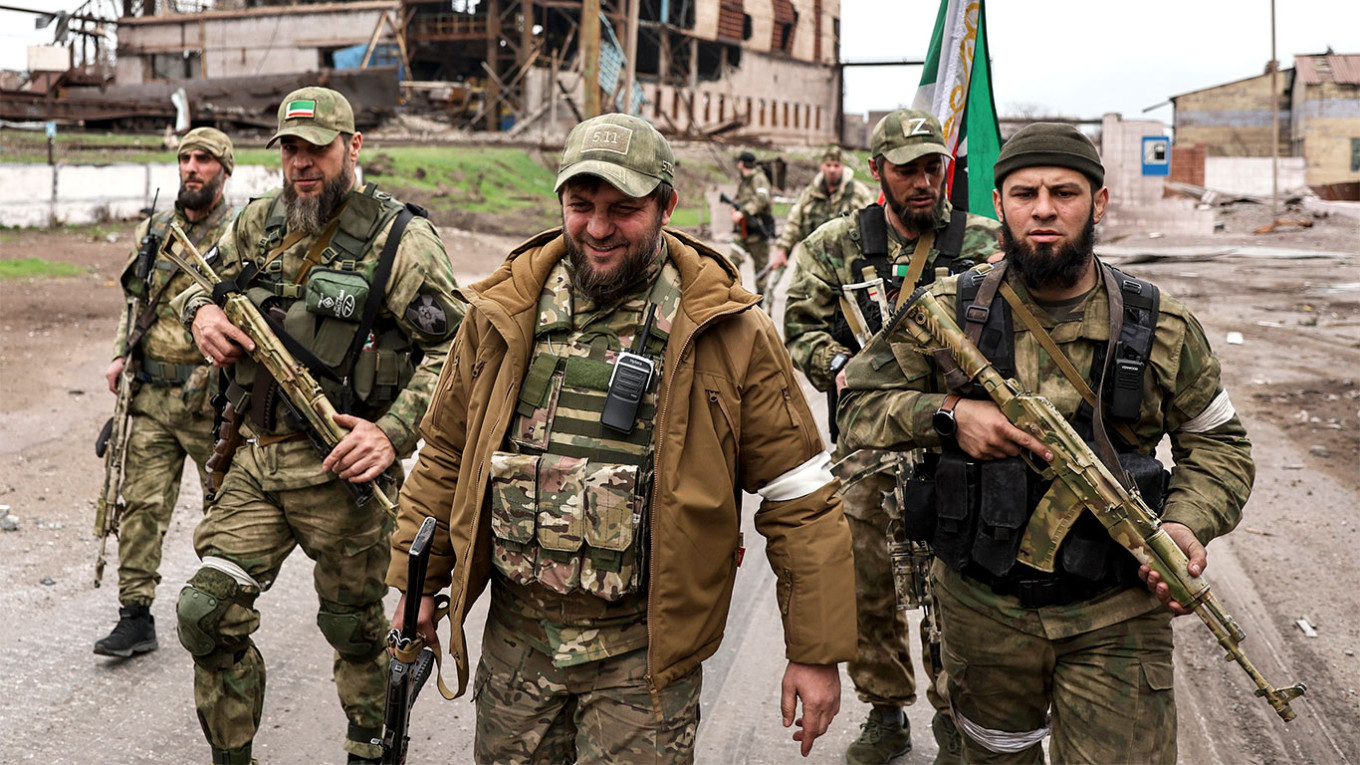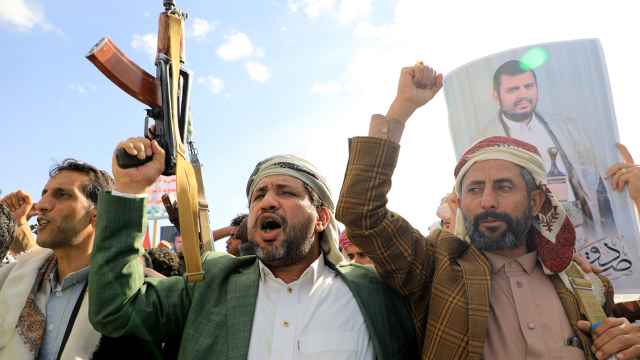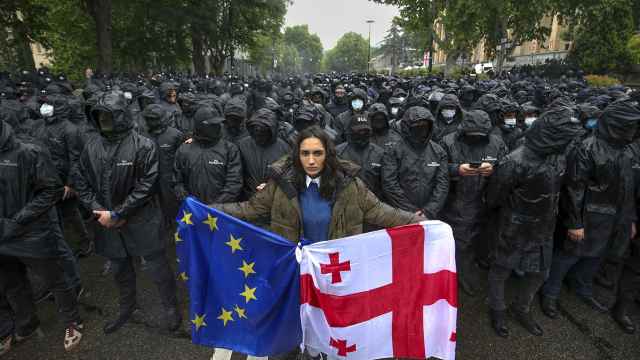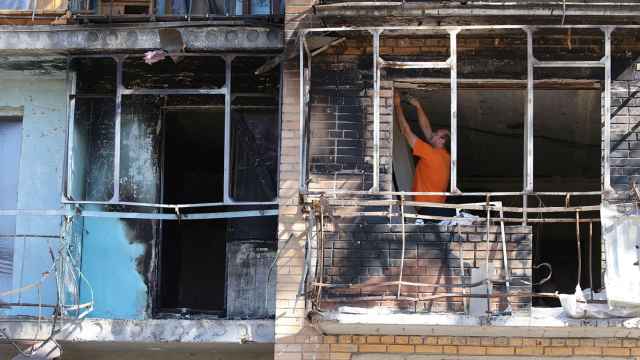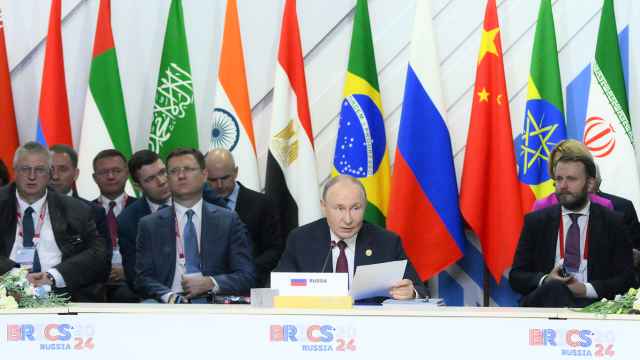In the wake of Yevgeny Prigozhin and his Wagner Group’s mutiny against Russia’s military leadership, many commentators postulated that the forces of Chechen leader Ramzan Kadyrov would fill their void. With Wagner now effectively banned from operating in Russia and Ukraine, have these Kadyrovtsy actually stepped into the mercenaries’ role?
To be succinct, they have not. The Kadyrovtsy, which are formally part of Russia’s National Guard, lack the ability to conduct actual military operations, compared to their typical counterterrorism-style policing — and Kadyrov’s ambitions are placed elsewhere.
The disconnect between the Kadyrovtsy’s reputation as the Chechen strongman’s fearsome personal army and reality has been glaringly obvious throughout the war in Ukraine. Kadyrov’s forces were initially given high-profile assignments, such as an alleged order to assassinate Ukrainian President Volodymyr Zelensky and capturing Mariupol and its Azovstal steel plant. They failed to achieve either objective.
As a result, they are now better known for activities including desertion control, fighting over looted goods and sitting behind the action to preen for propaganda videos for Kadyrov’s Telegram channel. This is to say nothing of their treatment of civilians in Ukraine’s occupied territories, the extent of which is not yet known. But brutality toward civilians is the Kadyrovtsy’s specialty.
In May, a member of the Sheikh Mansur Battalion, a Chechen volunteer unit defending Ukraine since 2014, said that the Kadyrovtsy were absent from the front line, and there has been little evidence since then that they have been redeployed there.
This absence is most likely by design. During the first month of the full-scale invasion, the Kadyrovtsy were part of the vanguard force pushing toward Kyiv. Their failure during this operation forced Kadyrov to change tactics and dress down his commanders.
The Kyiv-front leaders were called back to Chechnya and replaced by Adam Delimkhanov, Kadyrov’s most trusted lieutenant, on the Mariupol front. Delimkhanov was ordered to revert to the “clean sweep” operations the Kadyrovtsy are accustomed to, their ineffectiveness as a conventional military force clearly proven. The nature of this SWAT-like operational style also meant that the Chechen leader’s soldiers stayed away from the intensity of the front line.
Kadyrov is not involved in the war because he shares Putin’s genocidal intent — he is instead primarily motivated by what he can get out of it. While the Azovstal plant was still under siege, Kadyrov was negotiating for significant financial stakes in Mariupol and offering to help with the Donetsk region’s reconstruction. These schemes have proved profitable. The Russian Spetsnaz University, Kadyrov’s pet project and home of the Akhmat Group special forces, reported that its revenue tripled last year. More recently, Kadyrov’s nephew was appointed as the head of Danone Russia after it was nationalized in July.
Further, Kadyrov has used the war to assert himself as a federal political actor and to promote his children within Chechnya, both as public figures and in the state apparatus. These are parts of his efforts to solidify his family’s position, given the current political uncertainty in Russia and paranoia about a possible new insurgency in his North Caucasus republic.
That the Kadyrovtsy have not stepped into Wagner’s role is abundantly clear from what they have been doing since the mercenaries’ failed rebellion — essentially continuing their pre-mutiny activities.
While the Kadyrovtsy were reported to have withdrawn from Russia’s Belgorod region on June 24 for an undisclosed reason, in reality they did not. On June 27, Zapad-Akhmat and Interior Ministry units were still operating in the Belgorod towns of Shchetinovka and Bogun-Gorodok. By July 3, they were in Naumovka, also in Russia. The Kadyrovtsy contingent seemingly did not arrive in Ukraine until July 8, claiming to be located near Odnorobovka on the Kharkiv front.
Two weeks later, they were back in Belgorod, chasing “scumbags from Ukraine'' who attacked Russian Defense Ministry vehicles in the region. This apparently referred to a cross-border incursion by Chechen rebels fighting on the side of Ukraine.
On July 31, these Kadyrovtsy units purportedly launched a preemptive attack on Ukrainian forces in Sotnitskii Kasachok, just across the border from Belgorod. In a video of the attack, one strike was geolocated to have hit a bush in Belgorod — missing Ukrainian territory altogether. They have continued conducting such actions in the border region.
The Akhmat Group special forces, which Kadyrov at one point hoped would become his own competitor to Wagner, was most expected to fill the operational gaps left by Prigozhin’s mercenaries. While the Akhmat Group may be engaged in fighting, the Kadyrovtsy, still, are not. The number of Chechen soldiers in Akhmat Group has dwindled since its creation, with the remaining ethnic Chechens kept from the front lines and non-Chechens forced to do the fighting, according to members of the unit captured by Ukrainian forces.
The Akhmat Group is the most threatening unit from Chechnya since Wagner left Ukraine. Not because of expectations that they would replace the mercenary outfit, but because they have captured a number of Ukrainian soldiers. Forced interviews with these prisoners of war can be found on the Telegram channels of Kadyrov and Akhmat Group commander Apti Alaudinov. the Akhmat Group’s capture of Ukrainian soldiers should raise grave concerns over their treatment, especially as previous prisoners of war have been taken to Chechnya to meet Kadyrov.
At the beginning of the month, the Sever-Akhmat battalion was fighting on its own near their headquarters in the largely destroyed town of Marinka in eastern Ukraine, eventually joining Akhmat Group near Kleshcheevka. Toward the end of July, the unit’s messaging on its official Telegram channel shifted in tone, suddenly discussing Ukraine’s serious attempts to breach the line. A few days later, rumors began to swirl that Sever-Akhmat sustained significant casualties, which the battalion’s commanders condemned. While the Kadyrov administration’s denials should not be trusted, one cannot fully believe Ukrainian claims of mass casualties among the Kadyrovtsy without visual confirmation or reports leaking out of Chechnya.
Meanwhile, Vostok-Akhmat has been relatively quiet since Wagner’s failed rebellion. They were said to be positioned somewhere on the Orekhov front on July 14. A month later, they remain on that front, supposedly located near the village of Rabotyne. Besides filming with the Defense Ministry’s television channel Zvezda, it is unclear how they have been spending their time.
Kadyrov has only mentioned two National Guard units, the core of the Kadyrovtsy, serving on the front line since Prigozhin’s mutiny. The Akhmat-1 special unit was declared to be fighting on the Zaporizhzhia front, while the 94th Regiment had no location given. Kadyrov claimed earlier that they were engaged on “all lines of contact.” Considering how risk-averse Kadyrov is in relation to his internal security forces, it is doubtful that his units, the only two he dares to position in Ukraine, are actually on the front lines.
Finally, and of greatest concern, are reports that unspecified Kadyrovtsy units have been involved in two shootouts with other Russian soldiers since the start of August. As a result of the first incident, seven villagers in Urzuf were killed, along with several soldiers.
A few days after the first shootout, another group of Kadyrovtsy fought with soldiers from Dagestan in Mikhailovka, Zaporizhzhia region. In all, 20 people died and 40 more were injured. The Kadyrovtsy were reportedly punished for the shootout by being sent to the front line.
Bored and frustrated Kadyrovtsy are a recipe for disaster. And when these units are located behind the front lines, they are in closer proximity to civilians, increasing the risks for non-combatant casualties.
Frankly, the Kadyrovtsy will never fill the void left by Wagner, nor will they even come close to doing so.
Unlike Prigozhin, Kadyrov has domestic security concerns to consider, namely the threat of a renewed insurgency in Chechnya, which he has ruled with an iron fist following two separatist wars against Moscow in the 1990s and 2000s.
And as Dr. Emil Aslan, a professor of security studies at Charles University in Prague, has said, Kadyrov cannot afford to suffer losses on the scale of Wagner’s hemorrhaging of fighters in the battle for Bakhmut. As long as the casualty rate is high, the Chechen leader will avoid risking his troops on the front line as much as he can.
However, this means that they will continue to pose a very real threat to Ukrainian civilians that must not be discounted.
A Message from The Moscow Times:
Dear readers,
We are facing unprecedented challenges. Russia's Prosecutor General's Office has designated The Moscow Times as an "undesirable" organization, criminalizing our work and putting our staff at risk of prosecution. This follows our earlier unjust labeling as a "foreign agent."
These actions are direct attempts to silence independent journalism in Russia. The authorities claim our work "discredits the decisions of the Russian leadership." We see things differently: we strive to provide accurate, unbiased reporting on Russia.
We, the journalists of The Moscow Times, refuse to be silenced. But to continue our work, we need your help.
Your support, no matter how small, makes a world of difference. If you can, please support us monthly starting from just $2. It's quick to set up, and every contribution makes a significant impact.
By supporting The Moscow Times, you're defending open, independent journalism in the face of repression. Thank you for standing with us.
Remind me later.


